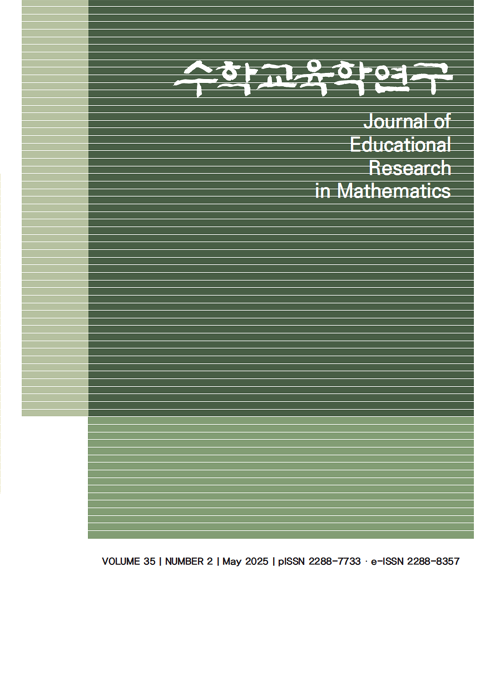- 영문명
- Development of an Instructional Model for Fostering Mathematical Competencies in an AI-Integrated Learning Environment
- 발행기관
- 대한수학교육학회
- 저자명
- 신동조(DongJo Shin) 김영인(Youngin Kim) 이경화(Kyeong-Hwa Lee)
- 간행물 정보
- 『수학교육학연구』제35권 2호, 395~417쪽, 전체 23쪽
- 주제분류
- 사회과학 > 교육학
- 파일형태
- 발행일자
- 2025.05.31
5,560원
구매일시로부터 72시간 이내에 다운로드 가능합니다.
이 학술논문 정보는 (주)교보문고와 각 발행기관 사이에 저작물 이용 계약이 체결된 것으로, 교보문고를 통해 제공되고 있습니다.

국문 초록
본 연구는 AI 통합 환경에서 수학 교과 역량을 효과적으로 함양하기 위한 교수⋅학습 모형을 개발하는 데 목적이 있다. 이를 위해 도구 통합 이론을 기반으로 ‘툴 기능’, ‘툴 역할’, ‘역량’의 세 차원으로 구성된 초기 모형을 제안하고, 수학교육 전문가 16인을 대상으로 두 차례에 걸친 델파이 조사를 실시하여 모형의 타당성과 적절성을 검토하였다. 델파이 조사 결과, 최종 모형은 ‘툴 유형’, ‘툴 역할’, ‘역량’의 세 차원으로 재구성되었다. ‘툴 유형’은 AI 통합 수업에서 교사가 교수⋅학습 목적에 부합하도록 적절한 AI 툴의 유형을 선택하고 배치하는 것으로 정의되며, ‘추천형’, ‘대화형’, ‘조작형’, ‘평가형’, ‘협업형’의 다섯 가지로 분류된다. ‘툴 역할’은 교사가 교수⋅학습 목적에 부합하도록 AI 툴의 교수학적 역할을 결정하는 것을 의미하며, ‘개념 이해’, ‘탐구증진’, ‘토론협력’, ‘흥미태도’, ‘절차유창’의 다섯 가지로 구성된다. ‘역량’은 교사가 학생이 함양하고자 하는 수학 교과 역량을 설정하고, 이를 달성하기 위한 교수⋅학습 과제나 활동을 설계하는 것을 의미하며, 수학과 교육과정에서 제시된 다섯 가지 교과 역량을 기준으로 구성되었다. 본 연구는 개발된 모형의 구조와 교육적 함의를 바탕으로, 실제 수업 설계 시 고려해야 할 유의 사항과 활용 방안을 논의하였다.
영문 초록
This study aims to develop an instructional model for effectively fostering mathematical competencies in an AI-integrated learning environment. To achieve this goal, an initial model was proposed based on the instrumental orchestration theory, consisting of three dimensions: tool function, tool role, and competency. A two-round Delphi survey was conducted with 16 mathematics education experts to examine the validity and appropriateness of the model. Based on the survey results, the model was refined into three dimensions: tool type, tool role, and competency. The tool type dimension is defined as teachers’ selection and arrangement of appropriate AI tools in accordance with instructional goals and consists of five categories: recommendation-based, dialogue-based, manipulation-based, assessment-based, and collaboration-based. The tool role dimension refers to the pedagogical roles assigned by teachers to AI tools in support of instructional goals. It comprises five roles: conceptual understanding, exploratory promotion, discussion and collaboration, interest and attitude, and procedural fluency. The competency dimension involves setting the targeted mathematical competencies for students and designing instructional assignments and activities to achieve them, based on the five core competencies outlined in the national mathematics curriculum. This study discusses the educational implications of the proposed model and suggests key considerations and application strategies for its implementation in actual classroom settings.
목차
Ⅰ. 서론
Ⅱ. 이론적 배경
Ⅲ. 연구 방법
Ⅳ. 결과 분석
Ⅴ. 결론 및 논의
REFERENCES
키워드
해당간행물 수록 논문
- 수학교육학연구 제35권 2호 목차
- 분포의 핵심 요소를 중심으로 한 예비수학교사의 협력적 논의 분석
- AI 통합 환경에서 수학적 역량 함양을 위한 교수⋅학습 모형 개발
- 2수준 단위 구조의 내재화에 따른 학생의 분수 개념 발달 분석
- 비와 비율 개념에 대한 초등 수학 교과서 비교 분석
- 초등학교 교사들의 주목하기 분석: 강점 기반 프레이밍과 결점 기반 프레이밍을 중심으로
- 탐구형 문제만들기 과제에 대한 중학생의 창의성 분석
- 분수 나눗셈에 대한 6학년 학생들의 표현적 사고 분석: 포함제와 단위비율 결정 맥락을 중심으로
- Responding to Students' Mathematical Ideas during Individual and Small-Group Instruction: What Makes It?
- 생성형 AI 기반 통계적 탐구 문제 설정 수업의 기회와 도전
- 초등학교 6학년 수학 교과서에서 제공하는 몫으로의 분수 개념에 대한 학습 기회 고찰
- 도형의 높이에 대한 교수학적 분석
- 대학 정수론 강의에서 학생들의 선택적 노트 필기에 관한 사례 연구: 동료 학생의 증명 판서에 대한 기록을 중심으로
참고문헌
- Preparing teachers to teach with technology
- International Journal of Computers for Mathematical Learning
- Computers & Education
- The mathematics teacher in the digital era: International research on professional learning and practice
- Educational Studies in Mathematics
- ZDM
- Handbook of cognitive mathematics
- ZDM
- AAAI 2019 Story-Enabled Intelligence
- Journal of Educational Computing Research
- Promises and implications for teaching and learning
- Practical Assessment, Research, and Evaluation
- Academic Medicine
- Proceedings of Society for Information Technology & Teacher Education International Conference 2009
- Personnel Psychology
- International Journal of Artificial Intelligence in Education
- The seventh mathematics education research seminar
- Mathematics Teacher: Learning and Teaching PK-12
- International Journal of Education in Mathematics, Science and Technology
- Proceedings of the Third Mediterranean Conference on Mathematics Education
- ZDM
- Educational Psychology
- The Mathematical Education
- Trends in Higher Education
- Mathematics
- Education and Information Technologies
- Education Sciences
- Contemporary Issues in Technology and Teacher Education
- Humanities and Social Sciences Communications
- The Obstetrician & Gynaecologist
- International Journal of Computers for mathematical learning
- Assessing mathematical literacy: The PISA experience
- Mathematics education in the age of artificial intelligence: How artificial intelligence can serve mathematical human learning
- Eurasia Journal of Mathematics, Science and Technology Education
- Communications of Mathematical Education
- Communications of Mathematical Education
- Human Settlements
- Journal of Elementary Education
- Journal of Educational Research in Mathematics
- The Mathematical Education
- Brain, Digital, & Learning
- Journal for Philosophy of Mathematics Education
- Journal of the Korean School Mathematics Society
- Korean Educational Research Journal
- Korean Society of Mathematics Education Journal
- Kyungmoonsa
- The Journal of Creativity Education
- School Mathematics
- The Journal of Korea Elementary Education
교보eBook 첫 방문을 환영 합니다!

신규가입 혜택 지급이 완료 되었습니다.
바로 사용 가능한 교보e캐시 1,000원 (유효기간 7일)
지금 바로 교보eBook의 다양한 콘텐츠를 이용해 보세요!



